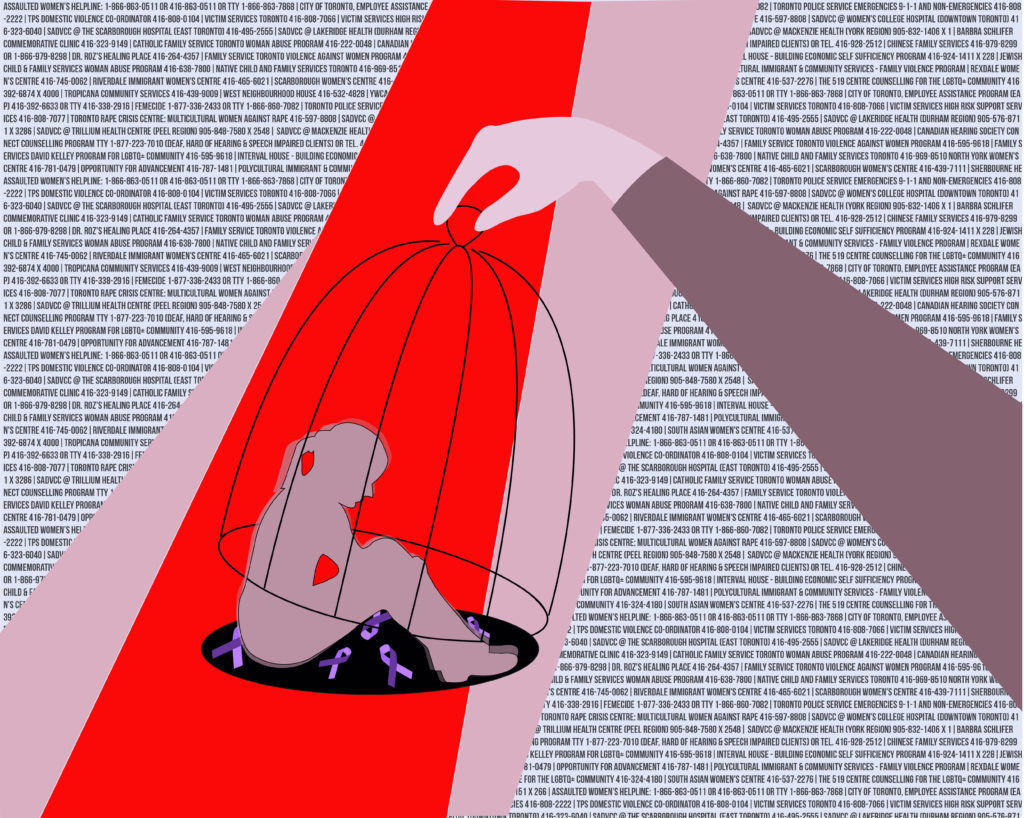
Content warning: In this article there are mentions of sexual assault, trauma, domestic abuse and addiction
Our memories are stored in either explicit or implicit ways. Explicit memories are ones that are often verbal and conscious, where we are fully able to remember them in the order that they happened, as well as recall details like the location, person we were with, etc. Trauma memories tend to be implicit, in that they are stored in an unconscious and fragmented manner and hold no order or connection to one another. According to Psychology Today, “They can, however, be easily activated by inputs from our senses in the present moment, causing us to intensely experience reminders of something that happened to us in the past.”
For survivors of sexual assault or abuse, trauma can unfold in unique ways and at unexpected moments. However, the recent COVID-19 pandemic has fostered a shadow pandemic in which some survivors find themselves being isolated in an unsafe space with their abuser and some struggle to find a safe space in their own minds and homes. Some experts argue that being in isolation or going through life changes, like those that have been induced by the pandemic, can cause an individual to subconsciously remember unexamined feelings or memories from the past. An example of how this happens would be my own experience, as a survivor of assault.
Memories of assault from my childhood started to resurface as the pandemic hit, when I suddenly found myself isolating inside of my tiny downtown Toronto apartment. I was away from my family, my friends and slowly felt my support system start to crumble. Being indoors all day forced me to face thoughts and feelings that I had long since forgotten, and the lack of access to counselling services meant that I had to figure out for myself how to take care of my mental health. The thought of speaking to someone through a Zoom video call about this trauma was unimaginable at the time. As we were all starting to adjust to this new way of living with air hugs and maintaining connections through video calls, I started to fade and coped with the trauma the best that I could with the existing tools that I had.
I did manage to get by and recognize what I needed for my own healing, but that was because I had the privilege of choosing to live with whom I wanted and to foster an environment where I felt safe to explore these feelings. This is a privilege to which women and children who live with their abusers do not have access. These survivors find themselves reliving past trauma and experiencing abuse, with a socially distanced support system, financial insecurity and a lack of accessible resources available during a pandemic.
Shelter Movers is a non-profit organization that has continued working throughout the pandemic, trying to provide these survivors with services that will take the financial burden of moving away from an abuser.
Eliminating one reason that women stay
Shelter Movers is an organization that was founded in 2016 by Marc Hull-Jacquin, who saw the high number of gender-based violence cases in Canada and decided to do something about it. During his paternity leave, he decided that he wanted to create a safer future for his own daughters, according to the Huffington Post.
Most shelters function to offer survivors who are fleeing their abuser with a safe space to stay or transitional housing once they have made the decision to leave. However, it is up to the survivor to decide when and how to leave their abuser, and that is where most of the uncertainty, which prevents women from accessing help, lies.
“Ninety-nine per cent of domestic violence cases include financial abuse,” says Allstate Foundation’s Purple Purse, a domestic violence awareness campaign. “It’s one of the main reasons survivors say they were unable to leave an abusive partner or had to return to one.”
Unlike most services available to survivors, Shelter Movers provides women with all the financial and practical resources that they may need in actually leaving their abuser. Abusers often use financial abuse as a means to control their partner’s actions. It can often start off as offering to pay a few bills and then taking control of their paycheques, credit cards and bank accounts, making it difficult for the survivor to escape. It is also a type of abuse that often goes unnoticed.
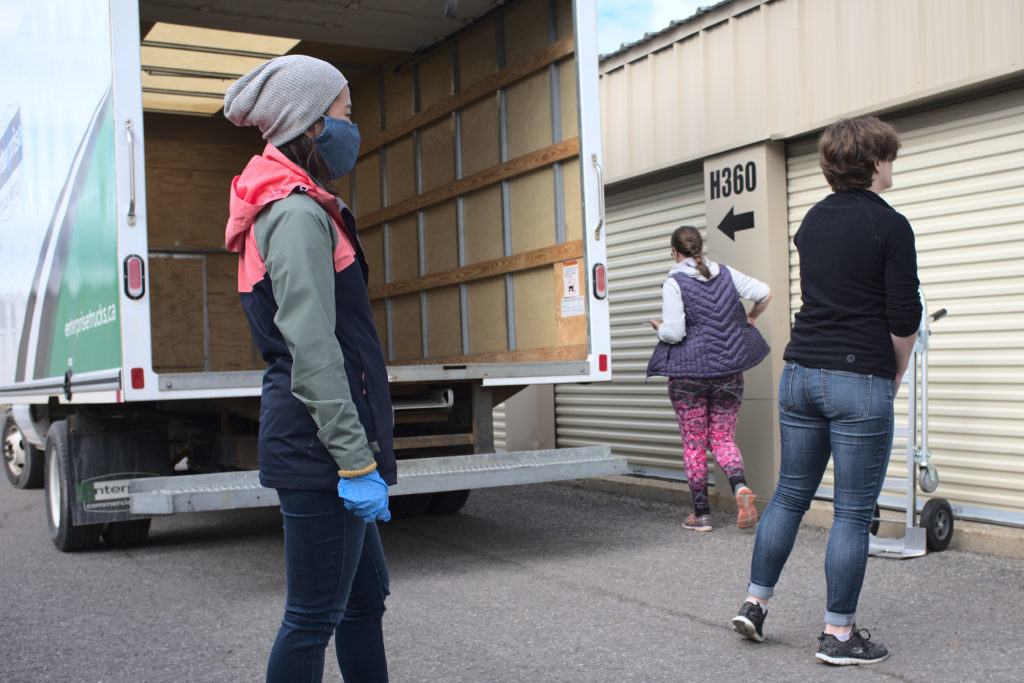
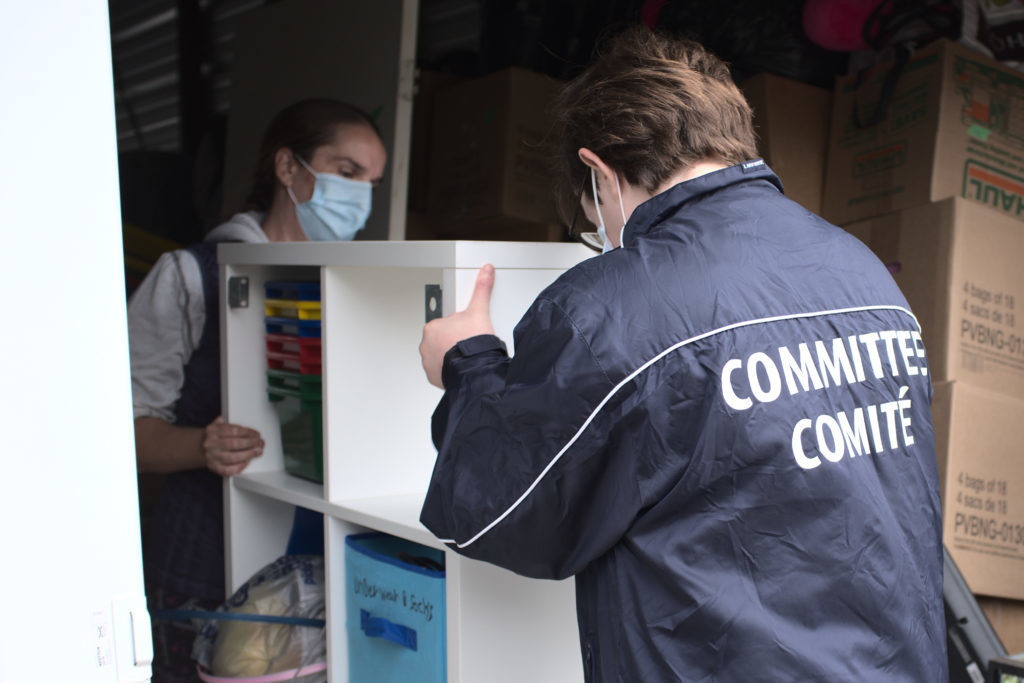
“The concept of moving is simple, yet safety and the financial aspect are huge barriers — barriers many people may overlook or take for granted,” says Trish Yeung, a board member of Shelter Movers.
The non-profit provides services including volunteers who help the survivors move from one location to another, moving trucks, packaging, boxes, storage and more. They are one of the only organizations in Canada that provides women access to free moving services and ensures that they have access to a safe space after.
“The impact is substantial,” says Maddie Quinn-Smith, the chapter director of Shelter Movers Greater Toronto Area. She began volunteering for the organization in 2016 as a move co-ordinator and says that she saw the direct, ground-level impact that it has had for women and children who require their services.
Survivors who are unable to sign up for a move request by themselves, because it may not be safe to do so, can use a referral agency or have someone else sign up on their behalf.
Barriers that marginalized women face when accessing services
As a survivor and woman of colour, navigating the resources that are available to me has been challenging. The intersections of my Muslim, Pakistani and female identity have created complexities in dealing with my trauma, especially during the pandemic. Shifting my personal life to a virtual screen in the past year, adopting a new form of social interaction, losing a job and not being able to move home all took a toll on my mental health, as I’m sure it has for many of my peers. In trying to access different resources online, from support groups to therapists, one thing that became glaringly clear to me was that not many of these options were made to cater people like myself.
That sparked an even darker thought: how do other women from minority communities, especially newcomers and immigrants who are in an unsafe space and facing abuse get help, if I, being in a position of privilege, am unable to.
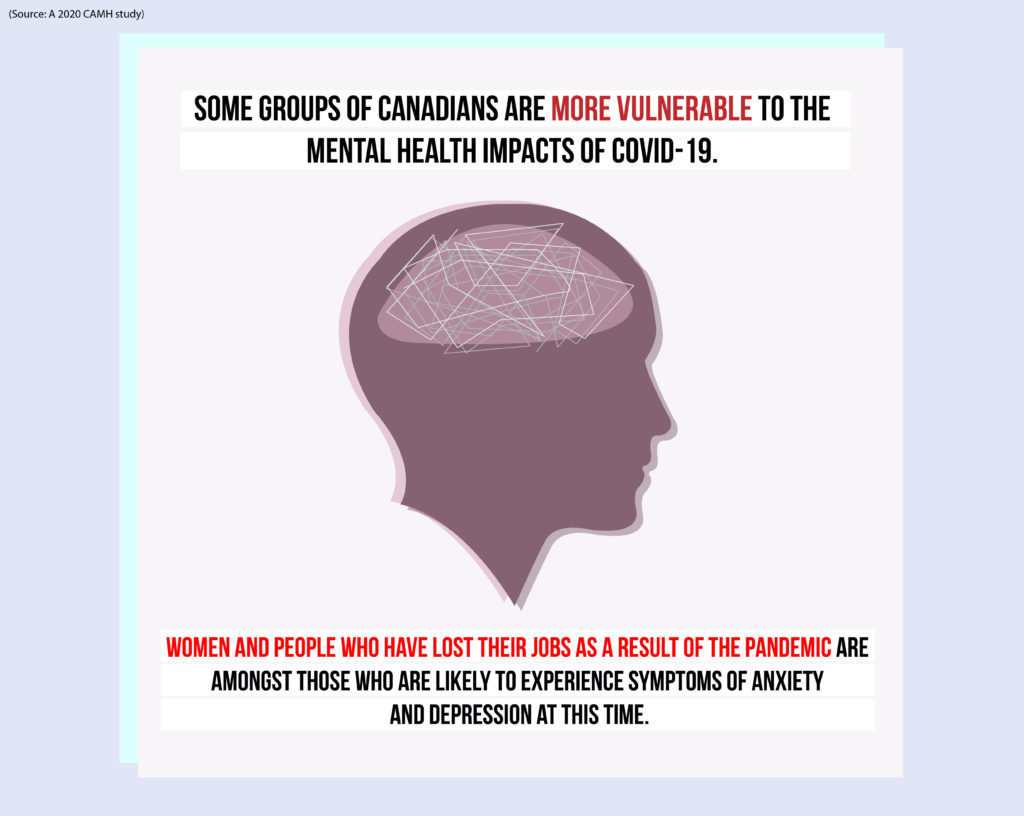
“What keeps women trapped is the ambiguity,” said Samra Zafar, author and survivor of domestic abuse, at a panel hosted by Shelter Movers.
I remember first meeting Zafar at a charity event supporting the funding of education for girls in villages in Pakistan, where she spoke with immense vulnerability about her abuse. She came to Canada as a Pakistani newcomer and a child bride who experienced domestic abuse from her ex-husband and his family. It went unreported for years because, as a newcomer, she was not fully aware of her rights or the community resources that were available. I remember distinctly the way she described how she took control of her own story as a survivor; she said she looked in the mirror one day and, instead of reaching for her makeup to cover up the purple bruises, she decided to leave for her two daughters.
Zafar in her book, A Good Wife, writes about the months of work it took to flee her abuser and how most of the pushback came from her own family, which is a reality for many women in the South Asian community. This struggle that she faced in coming forward about her story is one to which I have been able to relate. Seeing another individual who has experienced trauma in a similar culture was strangely comforting to hear, especially in understanding my own trauma.
A study done on visible minority women’s experiences with domestic violence revealed that these women often have difficulty accessing resources because of cultural insensitivity, language barriers, lack of information for newcomers on their rights as immigrants and more. According to the Wellesley Institute, “mainstream services that do not consider cultural norms and practices risk isolating women from their communities and/or not serving their immediate needs. Such barriers are problematic when considering solutions to violence against women.”
Indigenous women in Canada also experience higher numbers of violence than non-Indigenous women. According to the Interim Report on Missing and Murdered Indigenous Women and Girls, these minority women are more vulnerable to violence and are less able to leave because of a lack of emergency and safe housing available, as well as a lack of culturally appropriate health, mental health and addiction treatment centres.
It is no surprise that racialized women, newcomers and immigrants have trouble accessing these services. One way in which Shelter Movers is different from other women’s shelter services is that, according to Quinn-Smith, all volunteers are required to undergo trauma-informed training.
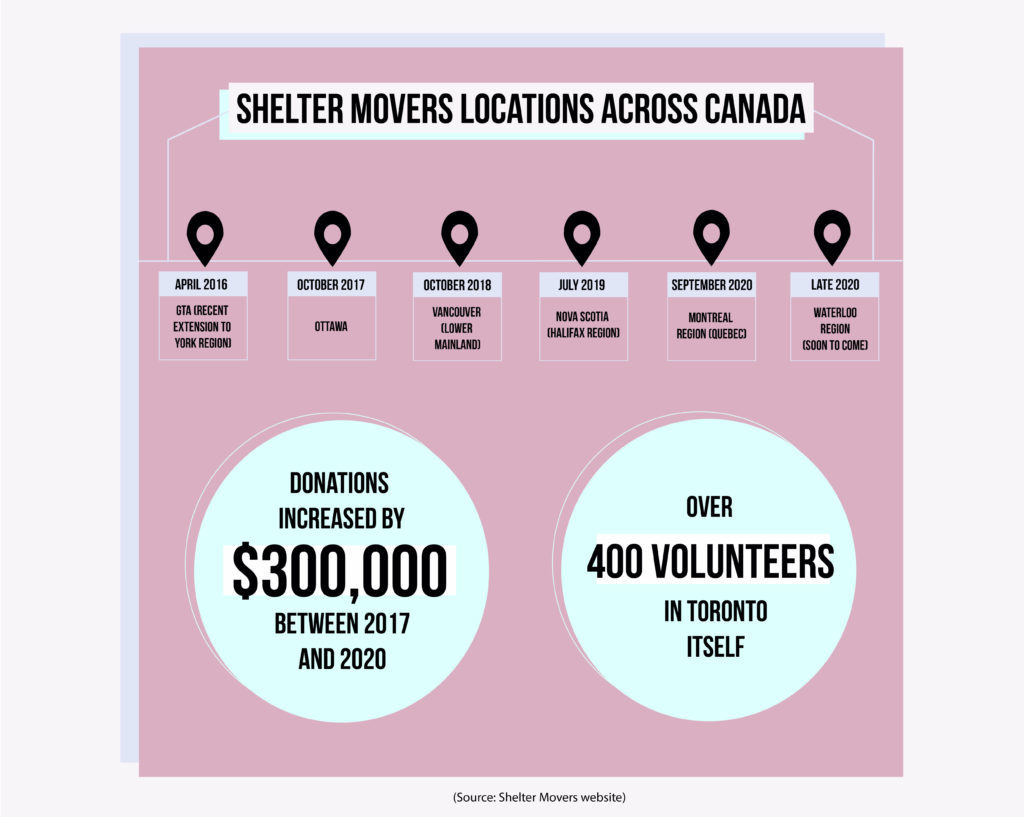
Yeung says all volunteers and staff have to attend anti-racism and anti-oppression training to understand the social relations of power, privilege and oppression. They offer interpretive services in which women whose first language is not English are able to communicate their needs as the moving process goes on.
They also offer free webinar training and panel discussions amongst other resources for racialized survivors and individuals who want to understand how they can help marginalised women gain access to resources.
Beyond the pandemic
“Isolation is being handed to abusers on a silver platter,” said Zafar at the virtual panel.
In the process of isolating during the periods of time when COVID-19 cases peaked, Zafar also found herself reliving her past trauma, when her ex-abuser isolated her from the community. Isolation is often used as a tool by abusers to maintain their control.
The number of domestic violence and gendered violence cases has peaked worldwide during the past few months, and Shelter Movers saw this translate in the high demand for moves. According to Yeung, the non-profit has witnessed a consistent national increase in the number of move requests since April.
Among the vast number of volunteers working to cater to this large number of moves is Lucy McPhee, who works as a stage manager and has been volunteering on the side since 2018. Now McPhee is a move co-ordination supervisor for the GTA region. She talks about how her team has been handling the increase in clients:
The pandemic has opened up the conversation about inequalities and how they have been exacerbated during this time. Minimum wage workers, and particularly women, have faced financial insecurity. Minority communities have had difficulties accessing health care and studies have shown that the rich have gotten richer, widening an already substantial wealth gap. These issues existed prior to the pandemic, and yet it took a pandemic for people to recognize how harmful privileged ignorance can be for marginalized people.
Similarly, the trauma that domestic abuse and sexual assault survivors face has only become the centre of attention now, when it has been experienced on a disproportionate level by women and children worldwide. Unless we can recognize that the experiences of marginalized survivors are valid and seen, these larger inequalities will continue to exist.
For survivors looking for resources provided by Shelter Movers, visit www.sheltermovers.com/request-a-move/. For other resources concerning domestic abuse/intimate partner abuse, visit www.toronto.ca/wp-content/uploads/2017/12/8c17-R1-Domestic-Intimate-Partner-Violence-Resources-FINAL.pdf
